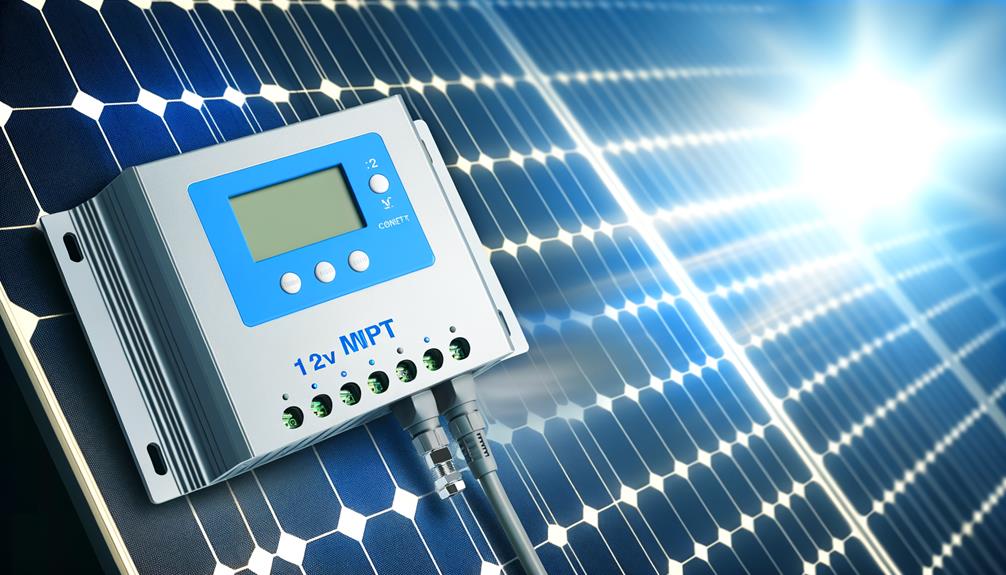So, you’ve decided to venture into the world of solar power and are in need of a 12V MPPT solar charge controller. Well, fear not, because in this buyer’s guide, we’ve got you covered.
We’ll take you through the ins and outs of choosing the best controller for your needs, from factors to consider and top brands in the market, to the pros and cons of MPPT solar charge controllers.
But that’s not all. We’ll also provide you with some helpful tips for making the right purchase.
So, get ready to take your solar game to the next level.
Key Takeaways
- MPPT charge controllers are more efficient than PWM charge controllers, offering up to 30% higher efficiency.
- When choosing a charge controller, consider the maximum power rating of the solar panels and ensure compatibility.
- Take into account the voltage and capacity of the battery, as well as the power requirements of connected devices and the overall voltage of the solar energy system.
- MPPT controllers can work with non-matching input voltages, maximizing power output, but may require professional setup and may not be necessary in warm and stable voltage conditions.
Factors to Consider When Choosing a Controller
When choosing a 12V MPPT solar charge controller, there are several key factors to consider.
MPPT charge controllers, also known as Maximum Power Point Tracking charge controllers, are more efficient than PWM charge controllers. They can optimize the power output from solar panels, maximizing the energy harvested from the sun.
One important factor to consider is the maximum power rating of the solar panels and the charge controller’s compatibility with it. The battery’s voltage and capacity should also be taken into account to ensure a proper match with the charge controller.
Additionally, it’s crucial to consider the power requirements of the connected devices and the overall voltage of the solar energy system.
Top Brands in the Market
Renogy Wanderer, BougeRV PWM Charge Controller, Victron Energy BlueSolar PWM, Renogy Rover, and BougeRV MPPT Charge Controller are among the top brands in the market for 12V MPPT solar charge controllers.
When it comes to choosing a solar charge controller for your 12V solar power system, it’s crucial to consider the brand and its reputation. These top brands offer high-quality controllers that ensure optimal efficiency and reliable performance.
Renogy Wanderer is a budget-friendly PWM controller suitable for various battery types. BougeRV PWM Charge Controller is an affordable option compatible with lead-acid batteries. Victron Energy BlueSolar PWM is a versatile controller that works with different battery types. Renogy Rover and BougeRV MPPT Charge Controller are both efficient MPPT controllers compatible with various battery types.
They’re designed to maximize the power output from your solar panels, allowing for higher voltage input and improved charging efficiency. Additionally, some of these controllers come with temperature sensors to protect your battery bank from extreme temperatures.
When selecting a solar charge controller for your solar setup, considering these top brands will ensure a reliable and efficient system.
Related Post: Efficiency and Safety: Unveiling the Best Solar Charge Controller.
Features to Look for in a Charge Controller
To ensure optimal performance and efficiency for your solar power system, it’s important to consider the key features that a charge controller should have. Here are three essential features to look for in a charge controller:
- Maximum Current Rating: The charge controller should have a maximum current rating that’s suitable for your system’s needs. It should be able to handle the current generated by your solar panels and deliver the appropriate amount of energy to your batteries.
- Voltage Rating: Check the voltage rating of the charge controller to ensure compatibility with your solar panels and batteries. It should be able to handle the voltage produced by the panels and charge the batteries efficiently.
- Additional Features: Look for charge controllers that offer additional features such as inbuilt USB ports, Bluetooth connectivity, and LCD displays. These features can provide added convenience and functionality, allowing you to monitor and control your solar power system more easily.
Pros and Cons of MPPT Solar Charge Controllers
MPPT solar charge controllers offer significant advantages over PWM controllers, making them a preferred choice for those seeking higher efficiency and better performance in varying conditions.
While MPPT controllers are more expensive, they can provide up to 30% higher efficiency compared to PWM controllers. This increased efficiency is especially beneficial for larger solar panel systems, as MPPT controllers can work with non-matching input voltages, maximizing power output.
However, the complexity of installing MPPT controllers may require professional setup, which can increase initial costs. Additionally, MPPT controllers are ideal for colder climates, as they can capture excess voltage as temperature drops. However, in warm and stable voltage conditions, they may not be necessary.
Despite the higher cost, MPPT controllers can lead to long-term cost savings due to their higher efficiency and better performance in varying conditions.
Tips for Buying a 12V MPPT Solar Charge Controller
When purchasing a 12V MPPT solar charge controller, there are several important factors to consider:
- Panel compatibility: Determine the type of panels you have in your solar system. 36-cell panels are suitable for PWM charge controllers, while 60-cell or 72-cell panels require MPPT controllers.
- System size: Consider the size of your solar system. PWM controllers work with any system size, but MPPT controllers are more efficient for larger systems, allowing for better energy harvesting.
- Voltage compatibility: Ensure compatibility between your solar power system and the battery you’re using. Check the voltage ratings of both the solar array and the battery to ensure they’re compatible with the MPPT controller.
Frequently Asked Questions
Which Solar Charge Controller Is Best?
The best solar charge controller for your needs is an MPPT controller, known for its high efficiency and advanced features. Consider key features, budget-friendly options, and proper sizing for optimal performance. Experience the benefits of using an MPPT controller today.
How Do I Know What Size Solar Controller I Need?
To determine the size of the solar controller you need, consider factors such as ampere rating, system voltage compatibility, solar panel wattage, battery capacity, load requirements, temperature variations, efficiency, power loss, overvoltage and overcurrent protection, and future expansion possibilities.
How to Buy a Solar Charge Controller?
To buy a solar charge controller, consider key features, price range, compatibility options, installation process, warranty and customer support, energy efficiency, user reviews, brand reputation, safety features, and additional functionalities.
Can I Use 24 Volt Solar Panels to Charge 12 Volt Batteries Through MPPT Controller?
Yes, you can use 24 volt solar panels to charge 12 volt batteries through an MPPT controller. It’s compatible and efficient, thanks to the voltage conversion process. The battery charging speed is optimized, with minimal power loss. It’s cost-effective, offers long-term performance, and meets safety considerations. Installation requirements are straightforward. Expert recommendations support this setup.
Conclusion
So there you have it, the best 12V MPPT solar charge controller for your needs.
After considering all the factors and weighing the pros and cons, it’s clear that the Renogy Wanderer and Victron Energy SmartSolar are top contenders.
With their advanced features and reputable brands, these controllers are sure to maximize the efficiency and lifespan of your solar battery system.
So go ahead and make an informed decision, and happy charging!




